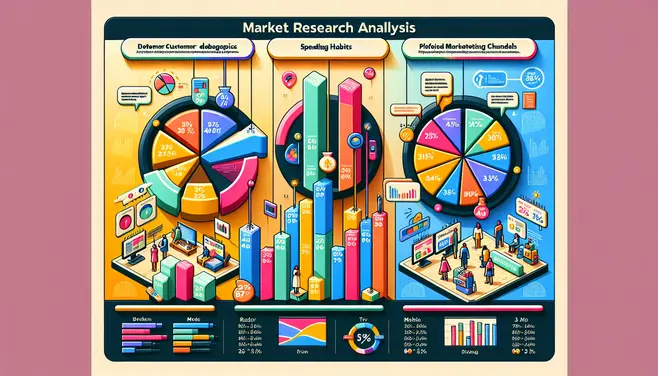The realm of marketing is undergoing a transformation, and it's largely driven by artificial intelligence (AI). For small businesses, embracing AI-driven marketing strategies isn't just a trend - it's becoming a necessity to stay competitive. As a small business owner, it may feel daunting, perhaps even overwhelming. So, let’s break it down.
AI can help small businesses gain insights, streamline operations, and deliver personalized experiences, all while working within tighter budgets. But what does that really mean? Think about it for a second - traditional marketing channels are becoming less effective, and consumers increasingly expect tailored content. As Jerry, a friend and small business consultant, once said, "Businesses that ignore AI in marketing are going the way of Blockbuster - outdated and forgotten." So, how can small businesses use AI to shift gears?

Understanding AI in Marketing
At its core, AI in marketing refers to using algorithms and data to predict customer behavior, automate processes, and enhance decision-making. Here's a look into its applications:
- Customer Insights: AI helps analyze customer data to understand preferences and behaviors, allowing businesses to tailor their offerings.
- Chatbots: Streaming operations is crucial, and AI-powered chatbots can provide 24/7 customer support, addressing queries promptly and efficiently.
- Predictive Analytics: Using past data to predict future trends can be incredibly beneficial for inventory and campaign planning.
- Personalization: From customized email marketing to targeted ads, AI allows you to deliver content that resonates with individual customer interests.
The Importance of AI in Small Business Marketing
You might wonder, “Why should I invest in AI when my current strategies are working just fine?” That's a valid question! The reality is that the marketing landscape is shifting, and the businesses that adapt are the ones that will thrive.
Startups and small businesses often have the advantage of agility, and incorporating AI into your marketing toolbox can exponentially boost this. It can enhance customer engagement, improve conversions, and ultimately lead to increased sales and growth potential.
Top AI Marketing Strategies for Small Businesses
Implementing AI can seem overwhelming at first glance, but there are several actionable strategies to make it manageable:
1. Utilize Chatbots for Customer Engagement
Imagine being able to answer customer inquiries around the clock without having to hire additional staff - sounds like a dream? Well, it’s now a reality! Chatbots can engage customers, guide them through your website, and answer frequently asked questions. They provide immediate support, keeping potential buyers from bouncing off your site due to unanswered questions. So, whether it's 3 AM or noon, your bot is there, speaking for you! Sites like Elephant.ai make adding chatbots easy and risk free.
2. Leverage Social Media Insights
Social media platforms have been integrating AI for years now. Use analytic tools powered by AI to analyze engagement trends, gain insights into your audience, and optimize your content strategy. By understanding what types of content generate the most interaction, you can tailor your posts accordingly, ensuring you’re on the right track.
3. Implement Personalized Email Marketing
One-size-fits-all marketing is so last decade! With AI, segmentation is easier than ever. By analyzing subscriber behaviors, you can send highly personalized emails that speak to their interests and needs. For example, if you run an e-commerce store, if someone frequently browses sports gear, an email suggesting related products can help convert interest into sales. AWeber is a great place to get started on email marketing.
4. Use Predictive Analytics for Inventory Management
No one likes to be caught off guard by inventory shortages or excesses. Using predictive analytics can help you forecast demand based on previous data, seasonal trends, and external factors. It enables you to maintain optimal inventory levels, cutting costs and reducing waste. Remember, less waste means better profitability!
5. Create AI-Driven Content
Content creation can be a labor-intensive process. Enter AI-generated content tools that can help with brainstorming, drafting, and even editing. Utilizing these tools can free up your time for more high-level strategic thinking while ensuring you’re not compromising quality. However, always review AI-generated content - you don’t want the robots taking over completely, right? You can use our own Adoozle AI assistant to generate content!

Navigating the Challenges of AI in Marketing
Of course, like any shiny new object, there are challenges. The transition to AI isn't flawless. Implementing new technologies requires training, time, and sometimes painful adjustments. Acknowledge that! But also, understand that there are many sites and tools out there to help you get started.
Moreover, while AI can optimize processes, it lacks the creative touch that connects emotionally with customers. So balancing the heart and the hard data is crucial. It's a classic tug-of-war between technology and humanity.
Embrace AI with Open Arms
As we stand at the precipice of the AI-driven marketing revolution, small businesses must embrace and adapt rather than resist change. This is not just an adjustment; it's an opportunity. A question remains: Will your small business be the one that leads through innovation or lags behind? Your response lies in your hands, quite literally if you engage with the technology wisely.
As you navigate this exciting frontier, remember to allow the human element to shine - because while AI may analyze data, it’s human creativity and connection that will always reign supreme.

Updated: May 12, 2025
Greg Swanson is a technology and business writer with 12+ years of experience in AI and digital innovation. He specializes in AI-driven business growth, SEO, and emerging tech trends, offering actionable insights to help businesses stay ahead in a competitive online world.
